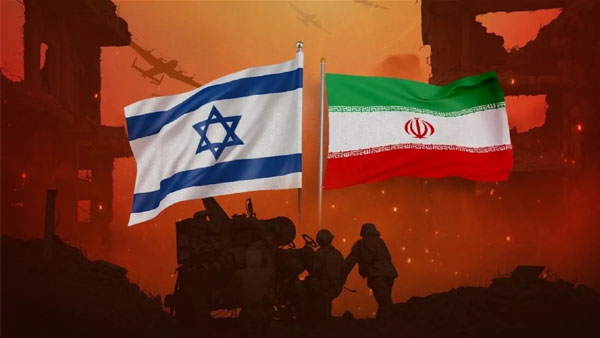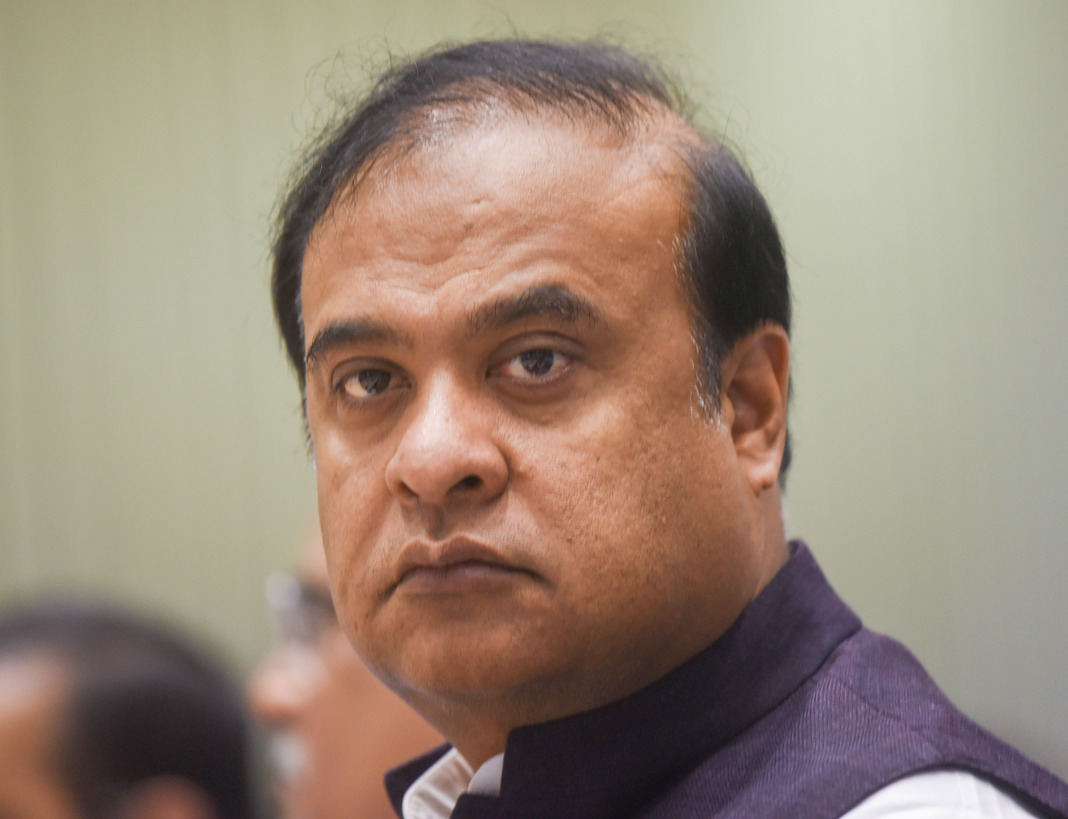By Satyabrat Borah
The escalating conflict between Iran and Israel has thrust the world into a precarious situation, raising fears that it could spiral into a global war. This confrontation, rooted in decades of animosity, ideological differences, and competing regional ambitions, has reached a critical juncture in 2025, with both nations engaging in direct military actions. The implications of this clash extend far beyond the Middle East, threatening to draw in major global powers and destabilize the international order. The potential for a third world war looms large, driven by the interplay of geopolitical rivalries, nuclear ambitions, and the involvement of proxy groups. This article explores the origins of the Iran-Israel conflict, its current dynamics, the factors that could lead to a broader global conflict, and the prospects for de-escalation.
The roots of the Iran-Israel conflict trace back to the establishment of Israel in 1948, which fundamentally altered the Middle Eastern geopolitical landscape. For many Arab and Muslim-majority nations, Israel’s creation was seen as an imposition by Western powers, sparking resentment that persists to this day. Iran, however, was not initially a central player in this opposition. Before the 1979 Islamic Revolution, Iran under the Shah maintained relatively amicable relations with Israel, driven by shared strategic interests against Arab nationalism. The revolution, however, transformed Iran into an Islamic Republic under Ayatollah Khomeini, who adopted an vehemently anti-Israel stance, branding it an illegitimate state and a tool of Western imperialism. This ideological shift marked the beginning of a deep-seated enmity that has only intensified over time.
Iran’s hostility toward Israel is multifaceted, encompassing religious, political, and strategic dimensions. The Islamic Republic views Israel as an occupier of Palestinian territories and a threat to Muslim unity. Iran’s leadership has repeatedly called for Israel’s destruction, a rhetoric that alarms not only Israel but also its Western allies. Strategically, Iran seeks to expand its influence across the Middle East, establishing a “Shia Crescent” from Tehran to Beirut through Iraq, Syria, and Lebanon. This ambition puts it at odds with Israel, which perceives Iran’s regional activities as an existential threat. A key flashpoint in this rivalry is Iran’s nuclear program, which Israel fears could lead to the development of nuclear weapons capable of targeting its territory. Iran insists its nuclear ambitions are peaceful, aimed at energy production, but Israel and much of the international community remain skeptical, citing Iran’s secretive activities and past violations of nuclear agreements.
Israel, for its part, has adopted a proactive and aggressive stance to counter Iran’s growing influence. Backed by advanced military technology and unwavering support from the United States, Israel has conducted numerous covert and overt operations against Iranian targets. These include cyberattacks, assassinations of Iranian nuclear scientists, and airstrikes on Iranian-linked facilities in Syria. Israel’s strategy is driven by the belief that a nuclear-armed Iran would be an intolerable threat to its survival. This fear has led to a cycle of tit-for-tat actions, with each side retaliating against perceived provocations, further escalating tensions.
The conflict took a dramatic turn in June 2025, when Israel launched a large-scale military operation dubbed “Operation Rising Lion” targeting Iran’s nuclear facilities and military bases. The operation resulted in significant damage to Iran’s infrastructure and the death of a senior Revolutionary Guard commander, General Hossein Salami. Iran responded with a barrage of missiles and drones targeting Israeli cities like Tel Aviv and Haifa, causing civilian casualties and widespread destruction. Iran’s Supreme Leader, Ayatollah Ali Khamenei, vowed “severe punishment” for Israel, while the Iranian Foreign Ministry labeled the Israeli strikes a “declaration of war.” These exchanges marked a shift from the shadow war of proxies and covert operations to direct military confrontation, raising the stakes significantly.
The involvement of proxy groups has long been a hallmark of the Iran-Israel conflict, complicating the dynamics and increasing the risk of escalation. Iran supports a network of militant organizations, including Hezbollah in Lebanon and Hamas in Gaza, which serve as its proxies in confronting Israel. Hezbollah, in particular, is a formidable force, possessing an arsenal of rockets and missiles capable of striking deep into Israeli territory. Israel has repeatedly targeted these groups, launching airstrikes and ground operations to degrade their capabilities. However, these actions often provoke retaliatory attacks, perpetuating a cycle of violence. The 2025 escalation has seen intensified activity by these proxies, with Hezbollah launching rocket barrages into northern Israel and Hamas firing missiles from Gaza, further straining Israel’s defenses.
The international community’s response to the crisis has been mixed, reflecting the polarized nature of global politics. The United States, Israel’s staunchest ally, has provided military and diplomatic support, deploying additional forces to the Middle East and reaffirming its commitment to Israel’s security. President Donald Trump, in his second term, has hinted at the possibility of direct U.S. military action against Iran’s nuclear sites, framing it as a necessary step to prevent a “nuclear holocaust.” This rhetoric has alarmed Iran, which has warned that U.S. involvement would transform the region into a “hell” for all parties. Iran’s Foreign Minister has called for restraint but also signaled readiness to retaliate against any foreign intervention.
Other global powers, notably Russia and China, have adopted more cautious positions but are closely tied to the conflict’s outcome. Russia, despite its preoccupation with the ongoing war in Ukraine, maintains strategic ties with Iran, supplying it with military hardware and diplomatic cover at the United Nations. China, heavily reliant on Middle Eastern oil, has a vested interest in regional stability but also sees Iran as a counterweight to U.S. influence. Both nations have urged de-escalation but have stopped short of condemning Iran’s actions, creating a diplomatic stalemate. Meanwhile, Sunni-majority states like Saudi Arabia and the United Arab Emirates, which share Iran’s hostility toward Israel but are wary of its regional ambitions, are navigating a delicate balance, quietly supporting Israel’s efforts to curb Iran’s influence while avoiding public alignment.
The prospect of this conflict escalating into a world war hinges on several critical factors. First is the potential for direct involvement by major powers. A U.S. strike on Iran could prompt Russia or China to intervene, either militarily or through economic measures, setting the stage for a broader confrontation. Second, the disruption of global energy supplies poses a severe risk. The Middle East accounts for a significant portion of the world’s oil production, and a prolonged conflict could choke off supplies, driving prices to unprecedented levels. This would exacerbate the ongoing global economic crisis, characterized by inflation and supply chain disruptions, potentially pushing nations into desperate measures to secure resources. Third, the specter of nuclear escalation cannot be ignored. An attack on Iran’s nuclear facilities could release radioactive material, creating an environmental catastrophe, while a cornered Iran might accelerate its nuclear program, prompting preemptive strikes by Israel or the U.S.
The economic ramifications of a wider conflict are daunting. Skyrocketing oil prices would trigger inflation, hitting consumers and industries worldwide. Developing nations, already grappling with debt and food insecurity, would face acute crises, potentially leading to social unrest. The interconnected nature of global markets means that disruptions in one region ripple across the world, amplifying the conflict’s impact. Moreover, the use of advanced weaponry, including cyberattacks and drones, could target critical infrastructure like power grids and financial systems, further destabilizing economies.
Efforts to prevent a global war are underway, though their success is uncertain. The G7 has expressed support for Israel’s right to self-defense but urged all parties to exercise restraint. Diplomatic talks in Geneva aim to revive negotiations over Iran’s nuclear program, but mistrust between the parties remains high. The United Nations has called for an immediate ceasefire, but its influence is limited by veto powers wielded by the U.S., Russia, and China. Regional actors, including Turkey and Qatar, have offered to mediate, but their ability to bridge the gap between Iran and Israel is questionable given the entrenched positions of both sides.
The Iran-Israel conflict stands at a crossroads, with the potential to either subside through diplomatic efforts or erupt into a global catastrophe. The stakes are immense, involving not only the survival of the two nations but the stability of the international system. A world war, if triggered, would bring unprecedented destruction, driven by advanced weaponry and economic interdependence. Yet, the possibility of peace, however slim, remains. International pressure, coupled with pragmatic leadership, could pave the way for de-escalation, perhaps through a renewed nuclear agreement or a regional security framework. For now, the world watches with bated breath as the Middle East teeters on the brink, hoping that cooler heads will prevail to avert a descent into chaos.




